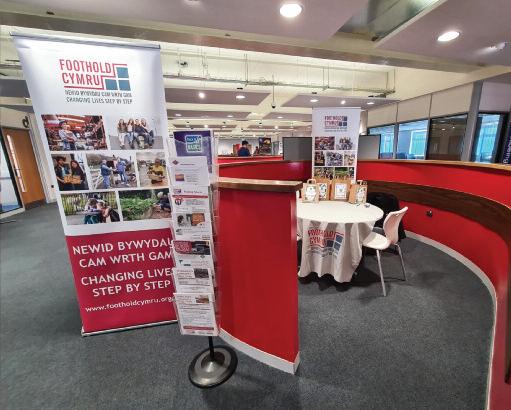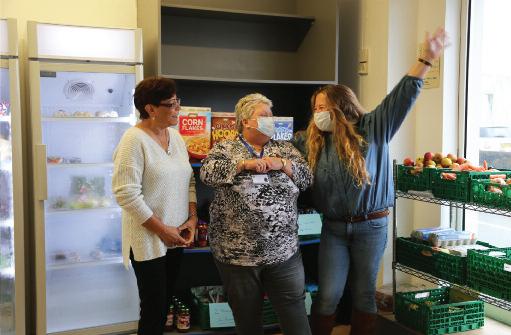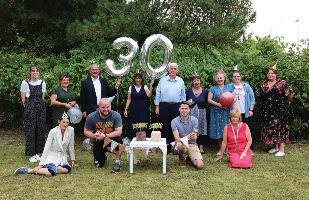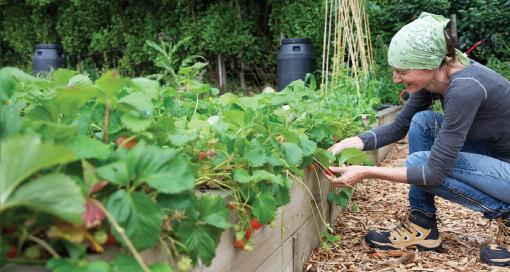
5 minute read
About Our Work
We run services and deliver projects which provide the support needed to promote our strategic objectives; we help people to ‘live well’, ‘learn well’ and ‘work well’. Similar themes underpin all of our projects and we work across four key areas:
• Food Resilience and Growing – we aim to build food resilience in the community, tackling the immediate needs of families who are struggling to put food on the table and helping them to develop the skills that will enable them to have a more sustainable and secure access to food in the future.
Advertisement
• Zero Waste Hub – we aim to help people to tackle the rising costs of living by encouraging recycling, upcycling, sharing and exchanging, giving members ways to reduce household costs and maximise hard-pressed family incomes. This also helps to reduce waste, having a positive environmental impact too.
• Education, Training and Employability – we aim to provide socially and economically disadvantaged people with the opportunities to develop the knowledge, skills and competencies required for independent living and for the labour market, by providing education, training and work experience opportunities.
• Community Capacity Building – we aim to bring the community together to share with and support each other through our volunteering and befriending projects. We also aim to develop the capacity of individuals to contribute and empower them to put their skills, experience and knowledge to good use for the benefit of the community.
The Impact of Our Work
As set out in this impact report, Foothold Cymru has had an overwhelmingly positive impact on its beneficiaries over the last year. The report sets out five key findings in relation to Foothold Cymru’s impact in 2021/22:
1. Reduced Household Expenses – members have experienced a reduction in their household expenses, through access to cheaper food at the Food Store, the opportunity to recycle, upcycle and share and the support with money management skills. The total household savings equate to over half a million pounds (£550,160).
2. Reduced Waste – members have learnt new ways to reduce their waste and have had the opportunity to share and recycle household items. 41 tonnes of waste has been diverted from landfill as a result result of our services.

3. Developed Skills and Experience – across the community, people have developed new practical and employability skills and have had the opportunities to engage with new experiences, including volunteering, work experience and befriending. 84% of members have learnt new skills and 55 people have moved on to employment.
4. Improved Health and Wellbeing – members are feeling more supported, valued, accepted, connected to the community and more confident to explore opportunities, which has had an overwhelmingly positive impact on the wellbeing of people across the community. 67% of members reported positive changes in their mental wellbeing.
5. Increased Community Cohesion, Capacity and Resilience – bringing people together to share, support each other and meet people they would not usually mix with has had a positive impact on community cohesion and on the capacity of the community to work together to solve common challenges. 88% of members feel there are more people they can go to if you if they need help and 59% feel more connected to their community.
1. Why We Exist
Established over 30 years ago, we exist to tackle the causes and consequences of poverty and to build the capacity and resilience of the people and communities affected. In this section, we outline some of the current challenges facing communities across Wales and highlight the areas that we are working to address through our range of programmes.

1.1. Poverty and Food Insecurity in Wales
Almost 1 in 4 (23%) people in Wales live in poverty, the highest rate of the four UK nations1. People living in poverty spend a higher proportion of their incomes on essential items and often pay extra to access essential goods and services, such as food, fuel and credit – a phenomenon named the poverty premium. This intensifies the problem and, as a result, people living on low incomes are often unable to afford the essentials required to live an active and healthy life. Of those living in poverty, 1 in 5 people are living with food insecurity, meaning that they cannot afford enough nutritious food to live an active and healthy life.
1.2. Cost of Liv ing Crisis
The well-documented ‘cost of living crisis’ is likely to make the situation worse for thousands of households already living in poverty across Wales. As prices rise at a faster rate than incomes, more families across Wales will have an income that isn’t sufficient to meet their basic cost of living. Inflation is on the rise, causing a rapid rise in living costs. Given that the lowest income households spend a higher proportion of their weekly expenditure on essentials, they are hit harder by rising costs. For those already struggling to make ends meet, the cost-of-living crisis will push many into the ‘eating or heating’ dilemma, if they are not already there.
1.3. Wellbeing and the Pandemic
The Covid-19 pandemic has had a negative impact on wellbeing across Wales. During the first lockdown in 2020 mental health conditions rapidly increased; in April 2020 28.1% of Welsh people suffered severe mental health issues, compared to 11.7% before the pandemic2.
Those living on the lowest incomes have been the worst effected by deteriorating mental health since the Covid-19 pandemic. The average mental wellbeing score deteriorated by 39% for lowest-income earners compared to the pre-Covid-19 period, contrasted to a 6.5% deterioration for the highest-income earners over the same period, widening the gap between the lowest and highest-income earners3.
1https://www.jrf.org.uk/data/uk-poverty-rate-region
2https://www.cardiff.ac.uk/ data/assets/pdf file/0010/2533762/COVID-19-Mental-health-FINAL-08-07-2021.pdf
3https://www cardiff ac uk/ data/assets/pdf file/0010/2533762/COVID-19-Mental-health-FINAL-08-07-2021 pdf
1.4. Community Cohesion
In recent decades communities across the UK have experienced a decline in the sense of community, but relationships and community cohesion can play a vital role in economic security. Deep social trends are causing a decline in community connectedness, for example a decreasing number of people are reporting they have someone to rely on, that they swap favours with others in the community or that they talk to their neighbours4.
Evidence shows that more connected communities can foster better economic security and social inclusion. Our relationships and our connections to the community can influence our mental wellbeing as well as our economic security, for example if we have nobody to turn to for help when times get tough. The declining sense of community can have detrimental effects on the wellbeing and economic security of those living on the lowest incomes. Given the ever-growing challenges caused by the cost-of-living crisis on low-income families, community connectedness is needed now more than ever.
2. How Do We Help?
Economic, social and educational inclusion are embedded throughout our services. We help people to ‘live well’, ‘learn well’ and ‘work well’ by delivering projects across four key areas:
(1) Food Resilience and Growing, (2) Zero Waste Hub, (3) Education, Training and Employability, (4) Community Capacity Building.
2.1. Food Resilience and Growing

In order to tackle the high levels of poverty and food insecurity in Wales, we provide healthy foods at low prices, so that families can afford to access the foods they need for a balanced and healthy diet. We also support families to become more food resilient, by helping them to budget and introducing them to growing their own foods. We aim to both tackle the immediate needs of families who are struggling to put food on the table, and to help them to develop the skills they need to have a more sustainable and secure access to food in the future.
4https://www.jrf.org.uk/blog/stronger-together-indispensable-role-human-relationships-economic-security








